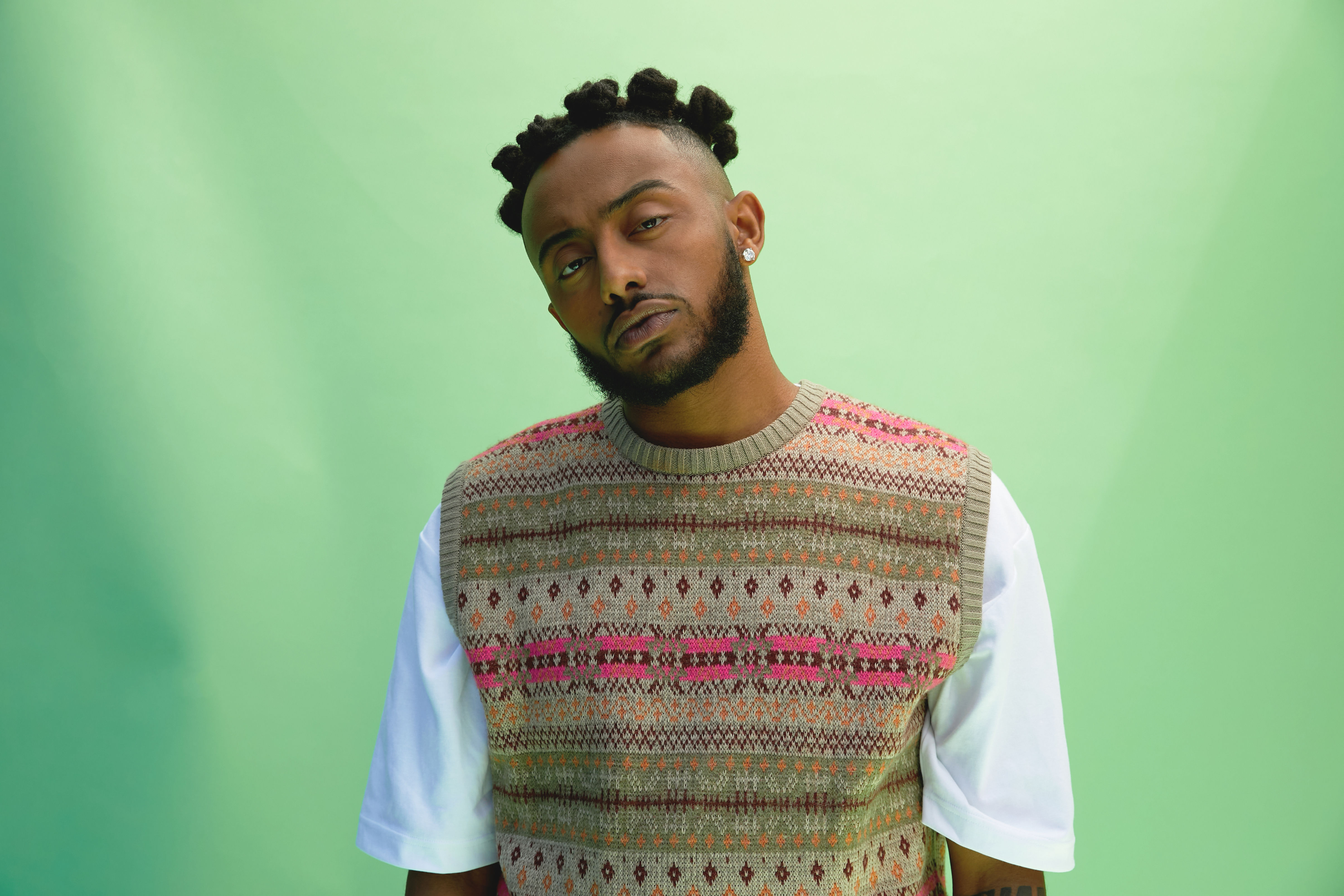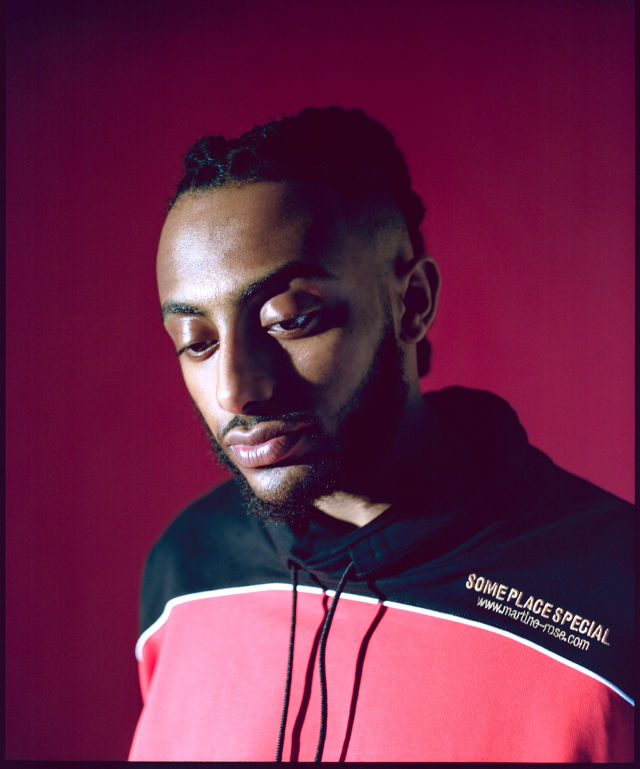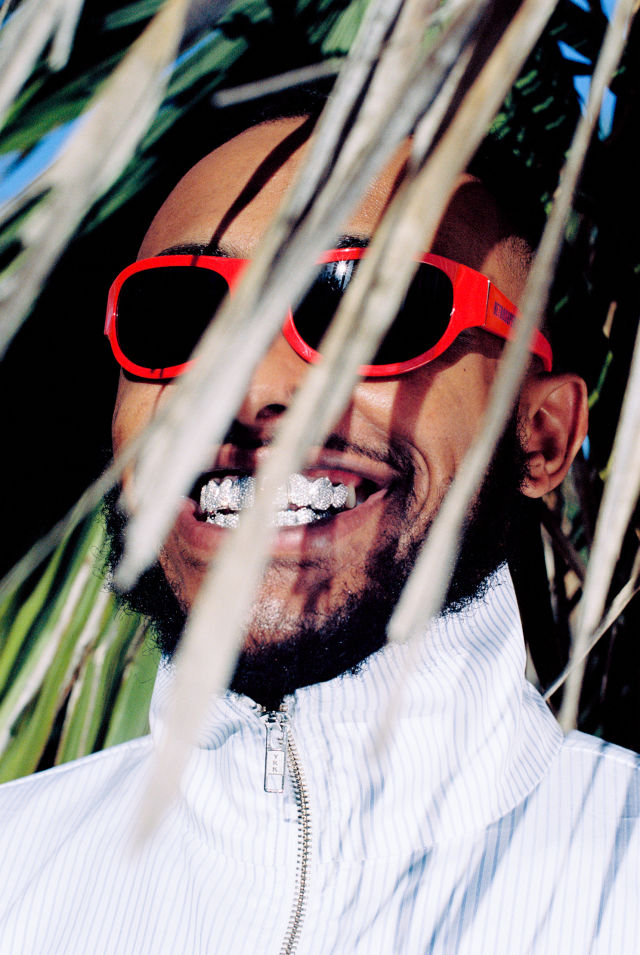
Aminé Speaks
Header photo by Micaiah Carter
Nothing ever goes as planned, but Aminé had a plan. The Portland-born rapper roared back into the ring in late February after a year away with a new, ODB-sampling single and perhaps the most Portland music video of all time. The visual for “Shimmy” (as in “Shimmy Shimmy Ya”) sees Aminé dancing on the Oregon Convention Center, lighting up a blunt on the Burnside Bridge, and riding Biketown bikes up and down Alberta with a full crew behind him. “Let’s not front,” the song begins, “it’s my year.”
Needless to say, that opener reads a little different now.
“Shimmy” was supposed to herald a fairly quick rollout for Aminé’s second LP, a proper follow-up to 2017’s spry Good for You after the moody 2018 mixtape OnePointFive. The album, called Limbo, had been recorded all over the world: on tour, in Jamaica, at a cabin in Portland’s West Hills. Some of its songs predated OnePointFive, and most had been through “like 20,000” iterations—Aminé was past ready to put it in the world, and he’d handpicked a release date near his mid-April birthday.
“We were so hype after we released ‘Shimmy,’ and then, you know, the world changed,” he says on a Zoom call from his home in Los Angeles. “It kind of hurt me, to be honest, beyond just the album plan. Emotionally, what I’d invested in this project meant a lot to me, and to not know when I was going to be able to put it out made me really emotional.”
After a few months of radio silence, Aminé emerged in June on Disclosure’s “My High,” quickly followed it with the Young Thug collab “Compensating,” and then announced the album at long last. Limbo finally comes out this week, and for all the fanfare, its biggest pleasures are small: simple wordplay, bouncy beats, no mention of the end of the world. In a year when the shadow of catastrophe hangs even over records finished pre-pandemic—Dua Lipa’s Future Nostalgia is “the soundtrack to the summer that never was”; Fiona Apple’s Fetch the Bolt Cutters will now and forever sound like an expression of our collective caged-animal urges to gnaw our own arms off—Limbo’s protracted process and conventional concerns are hugely refreshing. You can spin it front to back on a sweaty summer bike ride and almost believe that the center’s still holding.

"I just wanted people to know, I’m no better than you. I’m still figuring it out. I’m 26 now, I feel like an adult now, and I still feel like a young kid figuring it out.”
Image: Christian Lanza
Which isn’t to say it’s all rainbows. As work on the album stretched on through a world tour in support of OnePointFive, the songs absorbed emotional weight from major events back home that Aminé was missing: a friend’s stint in jail, a death in the family. “The thing that hurt the most wasn’t what happened, but that I was on tour,” Aminé says. “I missed a lot of birthdays. I missed a lot of things back home in Portland.” While songs like “Riri” pack plenty of the rapper’s signature brightness, the overall mood on Limbo is reflective. “I wanted people to see me in a different light for this,” he explains. “I was a bit tired of people expecting an artist or a celebrity or one of the first people to really make it from Portland, people expecting me to be a role model or to know exactly what to do. I just wanted people to know, I’m no better than you. I’m still figuring it out. I’m 26 now, I feel like an adult now, and I still feel like a young kid figuring it out.”
Unlike the vaudevillian interludes on Good for You and OnePointFive, Limbo is dotted with skits that tackle approaching adulthood and evolving ideas about contentment. “You’re eating a grapefruit with sugar in it, and you’re like, ‘This is nice,’” one goes. “Why is this nicer than my Ferrari?” They’re narrated by Aminé’s friend Jak Knight, a comedy writer on shows like Big Mouth and Black-ish. Aminé sent Knight the record, let him sit with it for a week and a half, and then the two discussed it in Aminé’s home with a recorder churning, laughing about youthful sexcapades and ruminating on the effect Kobe Bryant’s death had on both of them. “I knew I wanted him to narrate the album because he really understood that Black kid growing up in such a white state feeling,” Aminé says. “He grew up in Seattle and I grew up in Portland, but we both know exactly what kind of person we are.”
Historically, Aminé’s relationship to his hometown has been … complicated. “I always had a plan to do a video like ‘Shimmy,’ since day one,” he says: a full-fledged Rose City tribute. For fans, this might not have been so obvious. When Good for You’s viral single “Caroline” was blowing up, he did virtually no local press (Portland Monthly ran an interview-free Aminé profile in 2018 after he declined several requests), and, as he discusses on Limbo, he’s made a comfortable home for himself in LA.
“I’ve never ever ever shied away from the fact that I’m from Portland. I have a love and hate relationship with it. Growing up as a Black kid in that city, it wasn’t great. It was really not great,” he says. “With the ‘Shimmy’ video, I wanted to shine a light on very historical Black places and people, and show people, you know, we’re not to be fucked with. There were purposely no skits in that video, because I want people to know I’m serious.” It calls to mind the bright yellow billboard he funded on NE MLK Boulevard in 2018 that features his face, his name, and a pointed message: “Yes, there are Black people in Portland.”

“I’m not here to shuck and jive. I’m not here to be your favorite rapper on the TV screen. I wanted people to know that shit is going on in the world that needs to be addressed, and what better platform to do it on than national TV?”
Image: Christian Lanza
“Part of my problem with Portland [is that] to me, if I was a white guy from Portland who made it in music, I would definitely be so much bigger in that city. I’d be on, like, KGW news every week,” he says. On Limbo, he often voices these feelings bluntly, obliquely calling out Portland’s white legal cannabis scene on “Burden” and wrestling with his origins on “Roots.”
In ways he never could’ve foreseen, the summer’s Black Lives Matter protests suddenly trained the world’s eyes on Portland and its racial disparities after an OPB story about federal officers detaining protesters in unmarked vans became national news. “The biggest takeaway from this, other than it being my city, is like—what the fuck is going on? I didn’t even see that coming from a mile away,” Aminé says. “At this point, I expect a fuckin’ earthquake to just shake up the city. A disaster. A tsunami. I don’t even fuckin’ know, knock on wood. It’s just been a crazy, tough year, man. I don’t even know how to comprehend all of the shit that’s going on. I’m speechless half the time, you know?”
“I see a lot of the trouble he has to deal with as an artist that I would never have to deal with myself, and I think he put a lot of that into this album. A lot of those frustrations and qualms,” says Irvin Mejia, a.k.a. Pasqué, a frequent Aminé collaborator and one of the most prominent producers on Limbo. Mejia met Aminé through a mutual friend, and they produced “Caroline” together while they were still at Portland State University. Still, nothing on Limbo steps too far outside the personal—that ambivalence is wrapped up in songs like “Becky,” about a fraught interracial relationship, or the itchy “Fetus,” where he weighs the pros and cons of having a kid in a hostile world.
"I’m not a fan of explicitly political music. It’s been done before. My father grew up on Bob Marley, who is the king of this shit,” Aminé says. “I personally think there is not gonna be somebody who makes better music than that, so why speak on it so literally?” The only time he’s been moved to do so was in 2016, a week after Donald Trump was elected. He’d booked Jimmy Fallon for his first network TV performance, and during a stripped-down performance of “Caroline,” suddenly tore into a new verse: “9/11, a day that we never forgettin’ / 11/9, a day that we always regrettin’ / If my President is Trump then it’s relevant enough / To talk ’bout it on TV and not give a fuck / I’m Black and I’m proud / My skin is brown and I’m loud.”
“The thing I did on Fallon was because it was a late-night performance on live television for my first time ever, and I wanted to let people know, like, I’m not here to shuck and jive. I’m not here to be your favorite rapper on the TV screen. I wanted people to know that shit is going on in the world that needs to be addressed, and what better platform to do it on than national TV?” he says. “It was definitely nerve-racking for me to do that verse, though, just because I did it in front of, like, Midwest white people.”
If he’ll never be a protest singer, Aminé’s career is still expanding toward new horizons. This past spring, he made his acting debut on Issa Rae’s Insecure in a small role as Natasha Rothwell’s ditzy male love interest. It wasn’t for lack of offers. “They offered me a ‘Token Black Guy’ on Portlandia, and I was like—no,” he says, laughing. “Issa has been a good friend of mine, and she was the first person to offer me to play an actual character, and I thought it was really funny.” A deep love for pop culture permeates his music: one of Good for You’s best songs is called “Spice Girl”; Limbo calls out Britney’s meltdown, How Stella Got Her Groove Back, and Winona Ryder’s shoplifting scandal, to name a few. During lockdown, Aminé's hoovered up Succession and Alex Garland’s Devs. Down the road, he says, he’d love to write and perform on TV more.
For now, though, he’s hunkering down in LA and dropping an album without the expectation he’ll tour it. He sounds remarkably unburdened, even as he hopes to prove he’s “undeniably one of the best rappers out there.” Talking to him, you get the sense that he was made for this moment: an opportunity to rest on the strength of his talent without sweatily tap dancing to stay relevant. Limbo’s closer “My Reality” gives a whiff of his contentment, and it’s contagious. “As I sit here, stare at my things / My glass half full from the joy that they bring,” he raps on the final verse, “Living out the words that I used to say / We all dream, but to live this way?”
For a split second, it makes you feel like our collective limbo might just be bearable.




